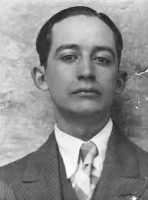August 27, 2015
Edited by David Sanders
Specimen Days
1635 – Lope Felix de Vega, playwright/poet (Angelica, Arcadia), dies at 72.
1849 – Manuel Acuna, Mexican poet (Nocturno), is born.
1870 – Amado Nervo, [Juan C Ruiz de Nervo], Mexican writer/poet, is born.
1903 – Xavier Villaurrutia, Mexican poet (Nocturno de los Angeles), is born.
1924 – David Rowbotham, Australian poet, is born.
2009 – Sergey Mikhalkov, Russian writer and poet (b. 1913), dies.

Death is all this and more that encircles us,
and brings us together, pulls us apart,
and finally leaves us confused, startled, hanging,
with a wound that doesn't bleed.
Then, only then, both of us alone know
that it is not love, but darkened death
that makes us look, face and face in each other's eyes,
and reach and come together, more than alone and stranded,
still more, and each time more, even still.
—from “Nocturne: The Bedroom” by Xavier Villaurrutia (1903–1950)
“Death is all this and more that encircles us,” —from “Nocturne: The Bedroom” by Xavier Villaurrutia (1903–1950)
World Poetry
Vietnamese Poet Revered as National Treasure
An international conference gathering more than 100 Vietnamese and foreign scholars here on Saturday confirmed once again the glorious life and literary work of great poet Nguyen Du (18th century), who richly deserved to be considered as a cultural symbol of the country. Addressing the conference, Dinh The Huynh, head of the Party Central Committee's Commission for Publicity and Education, said the event, that began a series of activities to commemorate the 250th birth anniversary of Nguyen Du (1766-1820) throughout the country next year, will go a long way in preserving and developing national culture.
C.K. Stead is New Poet Laureate

One of the country's most celebrated writers has been named as New Zealand's latest Poet Laureate. C.K. Stead has joined the ranks of luminaries such as Bill Manhire, Hone Tuwhare, and Elizabeth Smither, and will be formally inducted into the role later this month. Stead, a novelist, editor, literary critic, teacher and poet, said the appointment was special to him. "Poetry has been somewhere near the centre of my consciousness for the past 70 years, so this affects me more than any other honour I could have," he said.
Search for Spanish Poet García Lorca's Remains to be Resumed
The search for the remains of poet and playwright Federico García Lorca will be resumed next October if it receives green light from the Andalusia Board, announced today archaeologist Javier Navarro. Interviewed by Prensa Latina, Navarro explained that they already have all the necessary field resources, after interrupting last May the search due to the fact that the Andalusia government withdrew its financial support. The Spanish archaeologist explained that if the authorization is obtained, the project will be resumed in October, when temperatures are lower but there are still many hours of daylight.
C.K. Stead has been named New Zealand’s latest Poet Laureate.
Recent Reviews
‘Young Eliot,’ by Robert Crawford
By David Yezzi
In an unheroic age, T.S. Eliot was poetry’s ideal antihero. Shy, indecisive, gangly, he essayed the Parnassian heights not baroquely turbaned like a Byron but buttoned down and gray-flanneled like a Walter Mitty. By day, he was a Lloyds banker in “a four-piece suit,” as Virginia Woolf reportedly described him; by night, a visionary poet, whose lyric fragments harmonized with the malaise troubling Europe after World War I. The Scottish poet Robert Crawford’s assiduous “Young Eliot” follows “Tom” from his earliest poetic finger exercises to the “ineradicably insinuating music” of “The Waste Land” (1922), in which April cruelly breeds lilacs as well as a bramble of textual notes.
‘The Road Not Taken,’ by David Orr
By Adam Plunkett
David Orr has written the best popular explanation to date of the most popular poem in American history. That poem is “The Road Not Taken,” by Robert Frost, and its subject is familiar to most of us who attended an American or a Yankophilic middle school at some point in the last century: A traveler comes to a fork in the woods and, after sweating over his direction in life, takes the road less traveled, and it makes all the difference. Most of us have also heard the story that says this is all bunk. As interpreted in The New Yorker or “Orange Is the New Black,” the poem is not in fact an ode to individualism but a joke at the expense of individualist hokum. The traveler hasn’t been changed by his choice of a long and lonely road, but tells us that he’s going to tell that story when he’s older, even though he had no particular reason to choose the road he took. The other looked as grassy, as trodden, as easy or hard or distinctive. It was an arbitrary choice, this national myth of choosing independently and bravely and becoming the sum of your choices or finding yourself.
A New Collection from the Poet Laureate and Other Best-Poetry Books
By Elizabeth Lund

Notes on the Assemblage (City Lights; paperback, $14.95) provides a splendid introduction to the expansive work of Juan Felipe Herrera, the nation’s new poet laureate, who will read at the National Book Festival on Sept. 5. In this book, which will be released in September, readers will find a singular voice and an agile mind that shifts easily from one topic and style to another.
40 Sonnets by Don Paterson
by Stuart Kelly
From his earliest collection, Nil Nil, it was obvious that Don Paterson had a tremendous gift for the craft of poetry. Later collections have gravitated more and more towards traditional forms, and he has written an extended, and by turns insightful, poignant and hilarious prose commentary on Shakespeare’s sonnets. So this book has the kind of inevitability associated with a perfect rhyme, as well as the perfect sleight-of-hand whereby you didn’t see the inevitability coming. Amateur poets endstop lines with a cross between a metronome and tinnitus. A poet of genius, like Paterson, makes the chime simultaneously a cadence and a surprise.
“Notes on the Assemblage” provides a splendid introduction to the expansive work of Juan Felipe Herrera, the nation’s new poet laureate.
Poetry In the News
Maine’s Richard Blanco to read new poem at re-opening of the U.S. Embassy in Havana Friday

Maine poet Richard Blanco read a new poem commemorating the re-opening of the U.S. Embassy in Havana, Cuba, on Friday. Blanco, a Cuban-American who lives in Bethel, announced the news on Facebook on Wednesday.
Headstone is Mounted on Seamus Heaney's Grave: There's a Certain Poetry to this Simple, Evocative Marker
It's two years since the poet Seamus Heaney died in hospital in Dublin at the age of 73 and since his remains were returned for burial in his home village of Bellaghy in south Co Londonderry.
William Jay Smith, Poet and Craftsman of Rhythm, Dies at 97

William Jay Smith, a former United States poet laureate whose work was known both for its acuteness of observation and acuteness of craftsmanship, died on Tuesday in Pittsfield, Mass. He was 97. His son, Gregory Jay Smith, confirmed the death. Mr. Smith served from 1968 to 1970 as the consultant in poetry to the Library of Congress, as the poet laureate’s post was then known. He was the author of many volumes of poems, as well as criticism, memoirs, translations of poetry from a spate of European languages and children’s verse.
Cynthia Macdonald, Poet Known for Humor and Ability to Shock, Dies at 87

Cynthia Macdonald, whose idiosyncratic blend of humor and the grotesque made her a distinctive voice on the American poetry scene, died on Aug. 3 in a nursing home in Logan, Utah. She was 87. The cause was heart failure, her daughter, Jennifer Macdonald, said.
Recently, poet Richard Blanco read a new poem commemorating the re-opening of the U.S. Embassy in Havana, Cuba
New Books
Taking Shape by Jan D. Hodge
[Hardcover] Able Muse Press, 80 pp., $24.95

An eclectic mix of shapes and subjects populate Taking Shape―Jan D. Hodge’s full-length collection of carmina figurata (sometimes called shaped poems, pattern poetry, or figure poems). Hodge’s many masterpieces include depictions of a saxophone, a Madonna and Child, a combination piano/guillotine, and other silhouettes of amazing difficulty and detail. These poems are not only visually stunning, they are also sonically beautiful, and retain a transcendent freedom while conforming to both illustrative and metrical constraints. Taking Shape is a visual feast of inspired poetry.
Small Enterprise by Mary Biddinger
[Paperback] Black Lawrence Press, 70 pp., $13.95
The time: creeping toward the millennium, yet before Y2K panic inspires everyone to stockpile bottled water and cheap wine. The place: a Midwestern metropolis with echoes of Chicago, Cleveland, and Detroit, a city trying to preserve the past as a future arrives with gut rehabs and shuttered churches. The dramatis personae: corner bar denizens, bad girls with big plans, novels and their writers, a petulant lake, flocks of grandmothers with rosaries, a wrecking ball or two. Mary Biddinger's fourth full-length collection of poems, SMALL ENTERPRISE, introduces us to a world of risk and risk management, a continual struggle to stay afloat, and a hot triangular romance between man, woman, and city.
The Holding Hours by Christianne Balk
[Hardcover] University of Washington Press, 88 pp., $19.95

Emotion, raw and unadorned, is woven through the poems of Christianne Balk's The Holding Hours. Part I explores the subtle and surprising transformations that come from caring for her young, neurologically injured daughter. Insights unfold in metaphor and persona below the surface of an exquisitely observed life.
Caprice: Collected, Uncollected, & New Collaborations by Denise Duhamel and Maureen Seaton
[Paperback] Sibling Rivalry Press, 284 pp., $29.95
Caprice: Collected, Uncollected, and New Collaborations is the quirky love child of Denise Duhamel and Maureen Seaton, award-winning poets who teamed up over twenty-five years ago to practice their collaborative skills on every topic they could joyfully exploit: feminism, gender, sex, witches, religion, the canon, movies, and Olive Oyl, to name just a few. From the erotic to the comedic, the political to the poignant, Caprice presents a fresh look at life from the unpredictable minds of two celebrated writers in their prime.
The Nerve Of It: Poems New and Selected by Lynn Emanuel
[Paperback] University of Pittsburgh Press,120 pp., $16.95

Emanuel’s version of a “new and selected poems” turns convention on its head. She ignores chronology, placing new poems beside old, mixing middle and early poems with recent work, and liberating all her poems from the restraints of their particular histories, both aesthetic and autobiographical. Whether writing in the comedic drag of the cartoon strip, or investigating the Mobius strip relationship between reader and writer, or exposing the humor and hurt that accompany visitations from Frank O’Hara and Gertrude Stein, The Nerve of It both stings and pleases with its intelligence, wit and vivacity. It breaks through, in ways that are bold, sexy, haunting and wry, the die-hard opposition of new and old, personal narrative and linguistic play, sincerity and irony, misery and hilarity. Open the book. Something new is happening here.
New Selected Poems by Hans Magnus Enzensberger
[Paperback] Bloodaxe Books, 400 pp., $35.00
Not only Germany's most important poet, Hans Magnus Enzensberger is a provocative cultural essayist and one of Europe's leading political thinkers. This is intelligent and pointed poetry in the tradition of Brecht, humanely political and generously engaged. The poems have the ease and lightness of real mastery. They are moral in their insistence that human life can be lived well or badly, that it is up to us to choose well and to act wisely. Enzensberger is now writing with an increasing awareness of mortality, yet addresses social and political dangers and evils with undiminished urgency.
An eclectic mix of subjects populate Taking Shape―Jan D. Hodge’s collection of carmina figurata (sometimes called shaped poems, or figure poems).